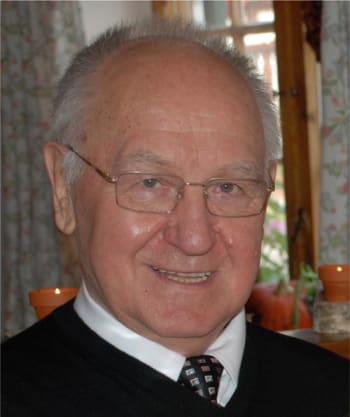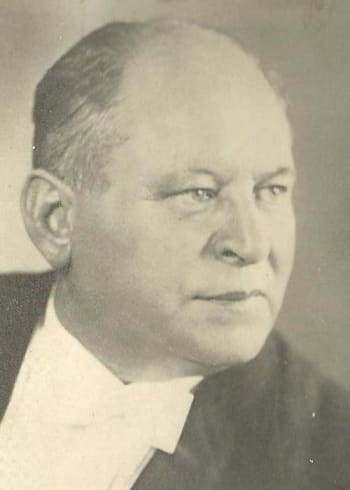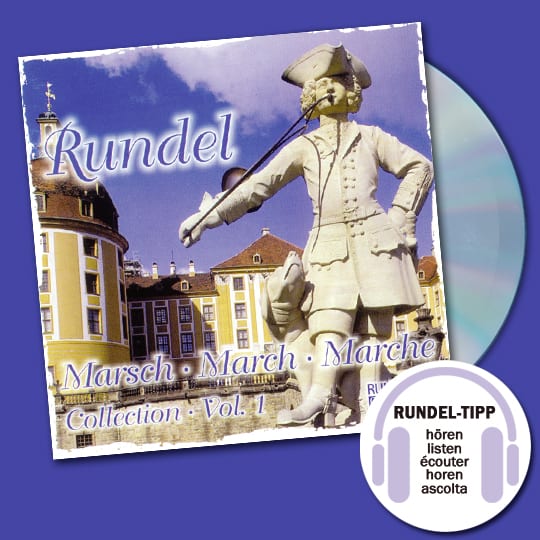Rundel Video: Abschied der Gladiatoren - The Gladiators' Farewell | Media center
HomepageMedia centerRundel Video: Abschied der Gladiatoren - The Gladiators' Farewell
This Media Center item can only be displayed if you agree to the use of marketing cookies. With one click you can accept it.
Abschied der Gladiatoren - The Gladiators' Farewell
Info
Notes available at:
https://www.rundel.de/en/
It is virtually impossible today to determine when Hermann Ludwig Blankenburg (1876-1956) composed his march ”Germany’s Princes”. Relying on remarks by the composer, however, it may be assumed that it was written between 1901 and 1903 during the composer’s Duisburg period. Only when he was pushed by some of his colleagues did Blankenburg agree to submit the manuscript of this march to Hawkes & Son of London, as this publisher had again organized a grand march competition. In this case too, the exact dates may no longer be traced down on the basis of data obtained from the files of the present publisher concerned, i.e. Boosey & Hawkes. Looking closely at the environment of those days, it appears to be probable that Blankenburg presented his march in 1904, and that the selection of winning compositions – out of some 500 entries – was made in 1905. The competitions organized by this London publisher aimed at gaining new marches of high quality, and consequently enjoyed an excellent Europe-wide reputation. In a number of cases, German composers were awarded first prizes (e.g. Starke, Zehle, and Rust). The winner of the 1905 competition too was a German composer, as the first prize was accorded to ”Germany’s Princes”. It is surely understandable that this title was changed to "The Gladiators’ Farewell" which presumably was an allusion to Julius Fucík’s superb Op. 68 ”Entry of the Gladiators” which he composed in the Bosnian city of Sarajevo in 1899. Although ”The Gladiators’ Farewell” is no street march at all, it rapidly became popular in Great Britain and even today it is regularly performed during the sterling historic pageants of British military music in London. The triumphal march of this composition around the world simply was not to be stopped. It definitely is one of the few marches of ”universal appeal” and therefore still is popular in Japan, in the United States, in Scandinavia, in the Netherlands, in Germany of course and in many other countries. It was even performed in the former Soviet Union. The high degree of uninterrupted popularity of this ”classic march” not only justified a contemporary arrangement for symphonic wind orchestra, it rather demanded it. Needless to underline that this approach also required a full set of parts together with a score. The new edition by Siegfried Rundel meets these special requirements in a truly ideal way.
Grade Level GB: 4-5
Grade Level USA: 3 (Intermediate)
Composer: Blankenburg, H.L.
Arranger: Rundel, Siegfried
Genre: Concert March, March
Performance time: 00:03:16
Publisher: Rundel
Size: A4
Info: Full Score + Condensed Score + Parts
Rundel Order Number: MVSR2312
Release Date: 1999
https://www.rundel.de/en/
It is virtually impossible today to determine when Hermann Ludwig Blankenburg (1876-1956) composed his march ”Germany’s Princes”. Relying on remarks by the composer, however, it may be assumed that it was written between 1901 and 1903 during the composer’s Duisburg period. Only when he was pushed by some of his colleagues did Blankenburg agree to submit the manuscript of this march to Hawkes & Son of London, as this publisher had again organized a grand march competition. In this case too, the exact dates may no longer be traced down on the basis of data obtained from the files of the present publisher concerned, i.e. Boosey & Hawkes. Looking closely at the environment of those days, it appears to be probable that Blankenburg presented his march in 1904, and that the selection of winning compositions – out of some 500 entries – was made in 1905. The competitions organized by this London publisher aimed at gaining new marches of high quality, and consequently enjoyed an excellent Europe-wide reputation. In a number of cases, German composers were awarded first prizes (e.g. Starke, Zehle, and Rust). The winner of the 1905 competition too was a German composer, as the first prize was accorded to ”Germany’s Princes”. It is surely understandable that this title was changed to "The Gladiators’ Farewell" which presumably was an allusion to Julius Fucík’s superb Op. 68 ”Entry of the Gladiators” which he composed in the Bosnian city of Sarajevo in 1899. Although ”The Gladiators’ Farewell” is no street march at all, it rapidly became popular in Great Britain and even today it is regularly performed during the sterling historic pageants of British military music in London. The triumphal march of this composition around the world simply was not to be stopped. It definitely is one of the few marches of ”universal appeal” and therefore still is popular in Japan, in the United States, in Scandinavia, in the Netherlands, in Germany of course and in many other countries. It was even performed in the former Soviet Union. The high degree of uninterrupted popularity of this ”classic march” not only justified a contemporary arrangement for symphonic wind orchestra, it rather demanded it. Needless to underline that this approach also required a full set of parts together with a score. The new edition by Siegfried Rundel meets these special requirements in a truly ideal way.
Grade Level GB: 4-5
Grade Level USA: 3 (Intermediate)
Composer: Blankenburg, H.L.
Arranger: Rundel, Siegfried
Genre: Concert March, March
Performance time: 00:03:16
Publisher: Rundel
Size: A4
Info: Full Score + Condensed Score + Parts
Rundel Order Number: MVSR2312
Release Date: 1999
Recommended Articles
Abschied der Gladiatoren
The Gladiators' Farewell
It is virtually impossible today to determine when Hermann Ludwig Blankenburg (1876-1956) composed his march ”Germany’s Princes”. Relying on remarks by the composer, however, it may be assumed that...Concert Band
MVSR2312
Recommended Persons
Siegfried Rundel
* 27.04.1940† 09.04.2009
Siegfried Rundel was born in Bußmannshausen on April 27, 1940. His fascination and natural talent for music showed from an early age. He played the trombone in the community band and tried first compositions and arrangements as a teenager. His teachers were pioneers of the German wind band development, such as Hans Feliy Husadel, Gustav Lotterer und Hellmut Haase-Altendorf. Siegfried Rundel...Info
Hermann Ludwig Blankenburg
* 14.11.1876† 15.05.1956
Hermann Ludwig Blankenburg wird zurecht als „deutscher Marschkönig“ bezeichnet, und dies, obgleich sein Leben wenig spektakulär verlief. Auch in der damals alles beherrschenden Militärmusik fanden seine Märsche keine Berücksichtigung als Armee- oder Heeresmarsch. Dies ist um so weniger verständlich, enthalten doch viele seiner Kompositionen jene Elemente, die einen zündenden Militärmarsch...Info
Media center
RUNDEL VIDEO
Hoch Heidecksburg
Notes available at:
https://www.rundel.de/en/
Hail Heidecksburg / The Watch Tower
It appears to be the fate of many a great, and even...
https://www.rundel.de/en/
Hail Heidecksburg / The Watch Tower
It appears to be the fate of many a great, and even...
RUNDEL VIDEO
Venezia
Notes available at:
https://www.rundel.de/en/
Marcia Militare Italiana
The march „Venezia” by Gaetano Fabiani (1841-1904) is...
https://www.rundel.de/en/
Marcia Militare Italiana
The march „Venezia” by Gaetano Fabiani (1841-1904) is...
RUNDEL VIDEO
Graf Zeppelin
Notes available at:
https://www.rundel.de/en/
Marsch / March / Marche
When one considers the lasting success of several sparkling marches by...
RUNDEL VIDEO
Jubelklänge
Notes available at:
https://www.rundel.de/en/
Sounds of Elation
The composer and music director Ernst Uebel (1882-1959) spent most of...
https://www.rundel.de/en/
Sounds of Elation
The composer and music director Ernst Uebel (1882-1959) spent most of...



